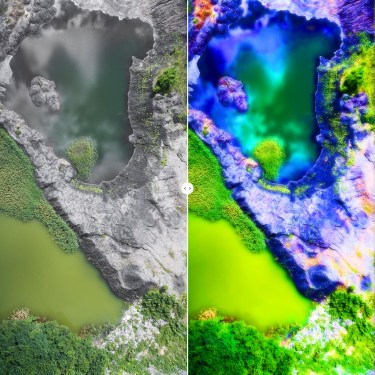Hyperspectral Startup Wyvern Signs Partnership with Loft Orbital for 2024 Launch
A Game-Changer in Earth Observation?
Wyvern, a hyperspectral imagery startup that graduated from Y Combinator’s Winter 2022 cohort, has made a significant move by booking space on the Loft Orbital satellite bus. This development is expected to boost the capacity of its Dragonette satellite constellation and marks a strategic decision to avoid building its own satellites.
A Capital-Efficient Approach
"We decided early on in Wyvern’s history that if we could avoid building our own satellites, we would," said Christopher Robson, CEO of Wyvern, in an interview with TechCrunch. "It’s capital efficient, and we leverage the capability and learning of industry partners. This also allows Wyvern to focus on delivering high-quality, high-resolution hyperspectral data while developing game-changing optical payloads."
By leveraging the capabilities of Loft Orbital and AAC Clyde Space, Wyvern is able to focus on its core expertise in hyperspectral imaging without shouldering the costs and complexities associated with building and launching its own satellites.
The Loft Orbital Platform
Loft Orbital offers a unique space infrastructure as a service (SIAS) model, which involves bulk-buying satellite buses and flying them as standardized platforms. The company’s Longbow bus, built by Airbus OneWeb Satellites, is designed to be highly versatile and can accommodate various payloads.
As part of the deal with Loft Orbital, Wyvern will utilize the Hub payload interface, referred to as the "brain" of the spacecraft, which controls payloads and manages dataflow and resources between onboard payloads and the satellite bus. Additionally, Wyvern will have access to Loft’s Cockpit software for the duration of the mission.
A Strategic Decision
Loft Orbital’s SIAS model offers a range of benefits for startups like Wyvern, including reduced capital expenditures, accelerated time-to-market, and improved scalability. By partnering with Loft Orbital, Wyvern is able to tap into the expertise of industry partners while focusing on its core business.
"We are thrilled to partner with Loft Orbital, whose innovative approach to space infrastructure as a service aligns perfectly with our goals," said Christopher Robson. "This partnership will enable us to deliver high-quality hyperspectral data to our customers while pushing the boundaries of what is possible in Earth observation."
A Growing Market
The demand for satellite-based Earth observation services is growing rapidly, driven by increasing concerns about climate change, natural resource management, and disaster response. Startups like Wyvern are well-positioned to capitalize on this trend, offering high-resolution hyperspectral data that can be used for a range of applications.
As the market continues to evolve, we can expect to see more startups and established players alike exploring innovative approaches to satellite-based Earth observation. The partnership between Wyvern and Loft Orbital is a prime example of how collaboration and innovation can drive growth in this exciting field.
The Future of Satellite Constellations
While many Earth observation startups have opted for building their own dedicated constellations, Wyvern’s decision to leverage the capabilities of industry partners represents a more capital-efficient approach. This strategy allows startups to focus on developing high-quality payloads while leveraging the expertise of established players in the field.
As the satellite constellation market continues to grow, we can expect to see more startups exploring innovative approaches to building and launching their own constellations. However, with the rise of space infrastructure as a service (SIAS) models like Loft Orbital’s, it’s clear that there are many viable alternatives for startups looking to access high-quality satellite-based Earth observation services.
About Wyvern
Wyvern is a hyperspectral imagery startup that specializes in delivering high-resolution data for a range of applications. The company has developed game-changing optical payloads and has two payloads operating in space, leased directly from AAC Clyde Space.
About Loft Orbital
Loft Orbital is a space infrastructure as a service (SIAS) company that offers a standardized platform for launching and operating satellites. The company’s Longbow bus, built by Airbus OneWeb Satellites, is designed to be highly versatile and can accommodate various payloads.
Conclusion
Wyvern’s decision to book space on the Loft Orbital satellite bus represents a significant milestone in the Earth observation industry. By leveraging the capabilities of industry partners, Wyvern is able to focus on its core expertise in hyperspectral imaging while developing game-changing optical payloads.
As the market for satellite-based Earth observation continues to grow, we can expect to see more startups exploring innovative approaches to building and launching their own constellations. However, with the rise of space infrastructure as a service (SIAS) models like Loft Orbital’s, it’s clear that there are many viable alternatives for startups looking to access high-quality satellite-based Earth observation services.
References
- [1] "Wyvern Books Space on Loft Orbital Satellite Bus," TechCrunch, January 6, 2025.
- [2] "Loft Orbital Partners with Wyvern to Provide High-Resolution Hyperspectral Data," PR Newswire, January 6, 2025.
- [3] "Wyvern and Loft Orbital Announce Partnership for Satellite-Based Earth Observation," Business Wire, January 6, 2025.
Related Articles
- [1] "Transportation: Toyota is Exploring the Use of Satellites in Autonomous Vehicles," TechCrunch, December 15, 2024.
- [2] "Space Technology: NASA’s Artemis Program Aims to Return Humans to the Moon by 2025," Space.com, January 10, 2025.
- [3] "Sustainability: Scientists Use Satellite Imagery to Track Deforestation in the Amazon Rainforest," The New York Times, January 12, 2025.
About the Author
The author is a freelance writer with a focus on space technology and Earth observation. They have written for various publications, including TechCrunch and Space.com.

